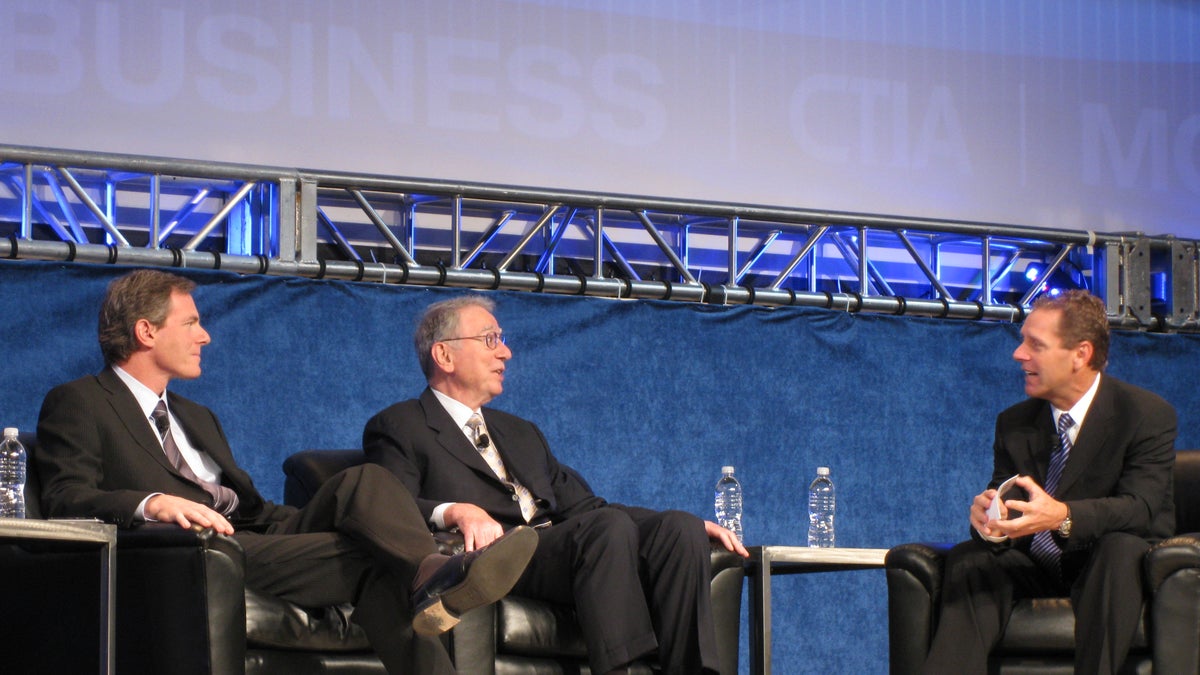Qualcomm execs: Wireless spectrum is maxed out
Irwin and Paul Jacobs, the father-and-son team who run mobile chipmaker Qualcomm say that more wireless spectrum is needed.

SAN DIEGO--Executives from mobile chipmaker Qualcomm said Thursday at the CTIA Fall 2009 show here that more wireless spectrum is needed to sustain current trends in wireless data traffic. The father-and-son duo who serve as chairman and CEO of the company respectively also warned against stringent Net neutrality regulation.
Irwin Jacobs, Qualcomm's founder, former CEO, and current chairman, and Paul Jacobs, Qualcomm's current chief executive, took the stage at the event with CTIA CEO and President Steve Largent for a conversation about the past and future of the wireless industry. As part of the discussion, both Jacobses said that more wireless spectrum is needed to keep up with the pace of customer demand for wireless Internet services. And they warned against strict regulation that could restrict operators' ability to manage their networks.
The CTIA, which is the lobbying organization for the wireless industry, has been pushing the Federal Communications Commission to allocate more spectrum for auction. The group sent a letter recently asking the FCC to allocate an additional 800 MHz of spectrum.
FCC Chairman Julius Genachowski said during his keynote address here Wednesday that finding more spectrum is the No. 1 priority for the agency. And he promised that the commission would do all it can to encourage more efficient use of spectrum, as well as, reallocate spectrum and find new spectrum to auction off.
Paul Jacobs, Qualcomm's current CEO, said that engineers are at their limit in terms of squeezing out efficiencies within the current bands of spectrum. Qualcomm, which was founded in 1985, has been instrumental in the development of the wireless industry. The company holds hundreds of patents and its engineers have invented technology that is fundamental to most cell phones used throughout the world today.
"We've done what we can in the lab to make mobile devices more efficient," he said. "We will have to use different tricks now to get to the next level."
He said that wireless operators, when building the next generation of 4G wireless networks, will have to build more dense networks with towers spaced closer together. He said managing the interference among these radios will be a challenge but that engineers will be able to figure it out.
The elder Jacobs also suggested using femto cells, which create personal cell sites to boost cellular phone signals in homes or offices.
The younger Jacobs said that wireless operators also need to add more capacity to their backhaul networks. This is the part of the network that connects the wireless tower to the carrier's backbone network. And the problem today is that many connections from the cell towers to the backbone don't have enough capacity to support the traffic coming from within the cell sites.
"With data there are large peak to average ratios," Paul Jacobs said. "Data traffic is very bursty, which means you need more head room in the backhaul network."
But even with increased capacity throughout the network, wireless operators will also have to manage their networks to handle the growing data traffic. Paul Jacobs added that the industry must be careful to avoid overly burdensome regulation that could interfere with this traffic management. He also said strict Net neutrality rules could hamper the development of new business models, such as the one that's used for the e-reader by Amazon Kindle. Customers who buy the Kindle don't sign up to a wireless service. The service is bundled into the cost of the device.
Paul Jacobs' comments echoed sentiments expressed by Ralph de la Vega AT&T's wireless CEO during his speech on Wednesday. De la Vega referenced "broadband hogs," who use a disproportionate amount of bandwidth. And he said it is important, especially with respect to wireless networks, to make sure that a few subscribers don't eat up all the bandwidth so that there is nothing left for other customers.
The comments come as the FCC prepares to make its Net neutrality principles for an open Internet official regulation. Critics of Net neutrality regulation, such as the phone companies, say they don't want to lose the ability to manage their networks. And de la Vega said specifically that he doesn't believe that wireless and wireline networks should follow the same regulations.
But Chairman Genachowski said he understands that Internet providers and wireless operators in particular need to manage their networks.
"We recognize there are differences between wired and wireline network technologies," Genachowski said during a press conference Wednesday. "They are different networks. And because they are different, I have said the rules that are adopted need to allow for reasonable network management. But we need to have clear rules of the road for everyone regardless of how they access the Internet."
Paul Jacobs said Thursday that he thinks Genachowski understands the wireless industry's challenges. But he said that other regulators and politicians may need more of an education.
"During the Internet bubble there was all kind of funding for dark fiber," he said. "And I think people thought carrying those bits was free. But it's not. It's expensive. And I think the regulators may not realize how expensive it could get."

